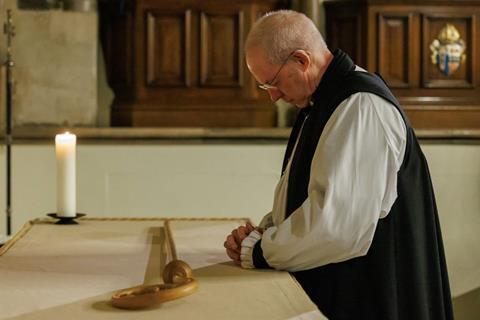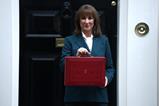As Justin Welby lays down his bishop’s crozier, George Pitcher takes a stab at writing a job description for the next Archbishop of Canterbury

In the back of the Church of England’s trade paper, Church Times, there’s a thriving classified ads section for clergy jobs, a veritable atlas of urban and rural ministries from Cumbria to Kent.
These churches list what they’re “praying for” their new rector or vicar to be. Invariably they want someone with ‘vision’ and ‘grace’, a good preacher who is also committed to pastoral care. Often, they seek an incumbent with a “sense of humour”, who can oversee “strategic growth”, offering leadership while also (and this crops up all the time) being “joyful”. They demand a “shepherd” and a “team player” who is “inspirational” and can deliver a range of varied worship styles over a number of churches in a “challenging” parish.
One wonders whether St Paul would make it through any of the interviews.
There are no job adverts for bishops. These appointments are made by the Crown Nominations Commission (CNC), a shadowy conclave that makes the history of freemasonry look positively transparent. This committee of worthies sends nominations to King Charles for rubber-stamping (or signing, if his pen works). The same goes for the Archbishop of Canterbury, whose process of appointment is now underway.
It’s the job that has to be changed, not the person
But perhaps this system should be replaced by a classified ad. The requirements of an archbishopric are, after all, simply those of a parish priest, writ very, very large indeed. And the CNC is really just a posh parochial church council.
Job description
Such an advert might go like this…
“The Church of England and worldwide Anglican Communion is seeking to appoint an Archbishop of Canterbury. We are praying for a prelate of considerable gifts, with sufficient professional vision to be willing to please all the people, all of the time.
“It is essential that he/she has an unassailable strategy for church growth, in all traditions. He/she will be required to satisfy not only the doctrinal traditions of evangelicals and Catholics in the Church of England on matters of sexuality and gender, but also keep east-coast liberal US clergy in same-sex marriages in communion with African traditionalists, who may wish to murder them.
“He/she will devise safeguarding policies that not only protect everyone in the Church from abuse, but also protect everyone who historically has been abused. The post requires oversight over the Diocese and Province of Canterbury, the largest in the UK, and regular attendance of the House of Lords (also as a Time Lord – see “safeguarding” above). A sense of humour is essential.”
I wonder how many would apply. Very few, I imagine, other than those maintaining the medieval traditions of penance by self-flagellation. The slightly more serious point to be made is that, put this way, the job isn’t just unattractive, it’s downright impossible. Not just in its demands, but in its scope.
Ringing the changes
It follows, I’m afraid, that if the CNC observes custom and simply sends a name to the king for a post with responsibilities that are impossible to fulfil, then the whole sorry cycle will occur again. The job invariably ends in tears. The penalties for failing to satisfy the varied and conflicting demands of Church and state have ameliorated over the centuries from cleaving of the head asunder with broadsword (Becket) to ignominious premature resignation (Welby).
It’s the job that has to be changed, not the person. And anyone in the Church with an ounce of the strategic management that it routinely demands of its parish clergy would revise the structure. Or we’re endlessly repeating the same mistake while expecting a different outcome.
Here, in a paragraph, is the necessary management review (which could perhaps be undertaken by a Royal Commission under the appointment of the Church’s supreme governor, the King): The worldwide Anglican Communion needs to be spun off, with a head – elected either democratically or semi-democratically on a model borrowed from the secretary-generalship of the United Nations or the presidency of the European Commission – that is regularly representative of all major traditions, perhaps in a five-year cycle.
One wonders whether St Paul would make it through any of the interviews
This leaves the Primate of All England with spiritual and pastoral oversight of Canterbury and the Church of England. This by no means implies that the archbishop butts out of politics, as defence of the marginalised and dispossessed are gospel imperatives. So he/she remains in the House of Lords until better cases are made for disestablishment. That would seem to marry both progressive and conservative politics and give the archbishop enough room to do a decent job.
Simples, as a non-primate mammal used to say. One danger is that creating a job that is actually possible to do may expose the paucity of candidates in the House of Bishops. But, in a way, that would be a service to the Church, too.
Meanwhile, it remains appropriate that archbishops have to retire at the age of 70. Not least because it doesn’t give me long enough to apply for the job.







































1 Reader's comment